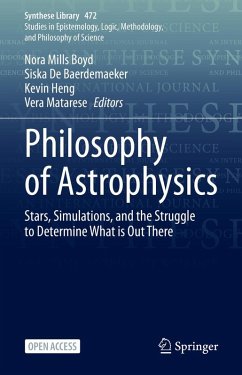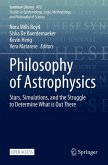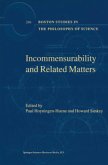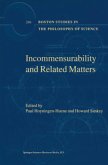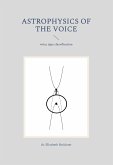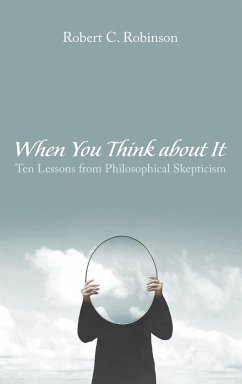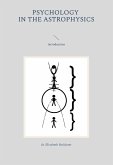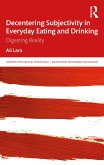Philosophy of Astrophysics
Stars, Simulations, and the Struggle to Determine What is Out There
Herausgegeben:Mills Boyd, Nora; De Baerdemaeker, Siska; Heng, Kevin; Matarese, Vera
Philosophy of Astrophysics
Stars, Simulations, and the Struggle to Determine What is Out There
Herausgegeben:Mills Boyd, Nora; De Baerdemaeker, Siska; Heng, Kevin; Matarese, Vera
- Gebundenes Buch
- Merkliste
- Auf die Merkliste
- Bewerten Bewerten
- Teilen
- Produkt teilen
- Produkterinnerung
- Produkterinnerung
This is an open access book. This book, the first edited collection of its kind, explores the recent emergence of philosophical research in astrophysics. It assembles a variety of original essays from scholars who are currently shaping this field, and it combines insightful overviews of the current state of play with novel, significant contributions. It therefore provides an ideal source for understanding the current debates in philosophy of astrophysics, and it offers new ideas for future cutting-edge research. The selection of essays offered in this book addresses methodological and…mehr
Andere Kunden interessierten sich auch für
![Philosophy of Astrophysics Philosophy of Astrophysics]() Philosophy of Astrophysics31,99 €
Philosophy of Astrophysics31,99 €![Incommensurability and Related Matters Incommensurability and Related Matters]() Incommensurability and Related Matters116,99 €
Incommensurability and Related Matters116,99 €![Incommensurability and Related Matters Incommensurability and Related Matters]() P. Hoyningen-Huene / H. Sankey (Hgg.)Incommensurability and Related Matters121,99 €
P. Hoyningen-Huene / H. Sankey (Hgg.)Incommensurability and Related Matters121,99 €![astrophysics of the voice astrophysics of the voice]() Geist Brücknerastrophysics of the voice19,99 €
Geist Brücknerastrophysics of the voice19,99 €![When You Think about It When You Think about It]() Robert C. RobinsonWhen You Think about It28,99 €
Robert C. RobinsonWhen You Think about It28,99 €![psychology in the astrophysics psychology in the astrophysics]() Geist Brücknerpsychology in the astrophysics22,99 €
Geist Brücknerpsychology in the astrophysics22,99 €![Decentering Subjectivity in Everyday Eating and Drinking Decentering Subjectivity in Everyday Eating and Drinking]() Ali LaraDecentering Subjectivity in Everyday Eating and Drinking195,99 €
Ali LaraDecentering Subjectivity in Everyday Eating and Drinking195,99 €-
-
-
This is an open access book. This book, the first edited collection of its kind, explores the recent emergence of philosophical research in astrophysics. It assembles a variety of original essays from scholars who are currently shaping this field, and it combines insightful overviews of the current state of play with novel, significant contributions. It therefore provides an ideal source for understanding the current debates in philosophy of astrophysics, and it offers new ideas for future cutting-edge research. The selection of essays offered in this book addresses methodological and metaphysical questions that target a wide range of topics, including dark matter, black holes, astrophysical observations and modelling.
The book serves as the first standard resource in philosophy of astrophysics for all scholars who work in the field and want to expand or deepen their knowledge, but it also provides anaccessible guide for all those philosophers and scientists who are interestedin getting a first, basic understanding of the main issues in philosophy of astrophysics.
The book serves as the first standard resource in philosophy of astrophysics for all scholars who work in the field and want to expand or deepen their knowledge, but it also provides anaccessible guide for all those philosophers and scientists who are interestedin getting a first, basic understanding of the main issues in philosophy of astrophysics.
Produktdetails
- Produktdetails
- Synthese Library 472
- Verlag: Springer / Springer International Publishing / Springer, Berlin / Swedish Research Council / Univers
- Artikelnr. des Verlages: 978-3-031-26617-1
- 1st ed. 2023
- Seitenzahl: 344
- Erscheinungstermin: 29. Juni 2023
- Englisch
- Abmessung: 241mm x 160mm x 25mm
- Gewicht: 682g
- ISBN-13: 9783031266171
- ISBN-10: 303126617X
- Artikelnr.: 67266790
- Herstellerkennzeichnung Die Herstellerinformationen sind derzeit nicht verfügbar.
- Synthese Library 472
- Verlag: Springer / Springer International Publishing / Springer, Berlin / Swedish Research Council / Univers
- Artikelnr. des Verlages: 978-3-031-26617-1
- 1st ed. 2023
- Seitenzahl: 344
- Erscheinungstermin: 29. Juni 2023
- Englisch
- Abmessung: 241mm x 160mm x 25mm
- Gewicht: 682g
- ISBN-13: 9783031266171
- ISBN-10: 303126617X
- Artikelnr.: 67266790
- Herstellerkennzeichnung Die Herstellerinformationen sind derzeit nicht verfügbar.
Nora Mills Boyd is an Assistant Professor of Philosophy at Siena College. Her research focuses on empiricism in philosophy of science, philosophy of experiment, and the philosophy of astrophysics and cosmology. After working as a research engineer at the University of Washington Center for Experimental Nuclear Physics and Astrophysics, she received her PhD in the History and Philosophy of Science from the University of Pittsburgh in 2018. She has published journal articles in Philosophy of Science and Studies in History and Philosophy of Modern Physics. Her Cambridge University Press Element Epistemology of Experimental Physics was published in the Philosophy of Physics series in 2021. Siska De Baerdemaeker is a researcher at Stockholm University. Between 2023 and 2025, she will work on a Project Grant from Riksbanken Jubileumsfond on the epistemology of experiment in context of dark matter research. Before, she worked as a postdoctoral researcher with Richard Dawid on theory confirmation in fundamental physics. She also has research projects on the history of relativistic cosmology in the 1920s and 1930s. In April 2020, she received her PhD in History and Philosophy of Science from the University of Pittsburgh. Her work has been published in Philosophy of Science, Studies in History and Philosophy of Modern Physics, and HOPOS. Her Cambridge University Press Element Philosophy of Cosmology and Astrophysics is under contract in the Philosophy of Physics series. Kevin Heng is Chair Professor (German: Lehrstuhlinhaber) of Theoretical Astrophysics of Extrasolar Planets at the Ludwig Maximilian University in Munich, Germany. He is Honorary Professor in the Department of Physics at the University of Warwick in the United Kingdom. Previously, he was the director of the interdisciplinary Center for Space and Habitability (CSH) at the University of Bern, Switzerland. He is the recipient of a 2017 European Research Council (ERC) Consolidator Grant and the 2018 Chambliss Astronomical Writing Award of the American Astronomical Society (AAS). He is mainly interested in the theory, simulation and phenomenology of the atmospheres of exoplanets, including atmospheric radiative transfer, chemistry, fluid dynamics and Bayesian data inversion methods. Recently, he has turned his attention to the geosciences, especially geochemistry as it is indispensable in the understanding of biosignatures and their false positives. He is the author of Exoplanetary Atmospheres: Theoretical Concepts and Foundations (2017, Princeton University Press). He has published over 170 peer-reviewed papers, including in the Astrophysical Journal (ApJ), Astronomical Journal (AJ), Monthly Notices of the Royal Astronomical Society (MNRAS), Astronomy & Astrophysics (A&A), Nature, Nature Astronomy, Science, etc; he has also published two modeling papers with epidemiologists. Vera Matarese holds a tenure track Assistant Professorship (RTDb) in Philosophy of Science at the University of Perugia (Italy). Before, she was a postdoctoral researcher in the Institute of Philosophy and a research fellow in the Center for Space and Habitability at the University of Bern. Her research focuses on the metaphysics of science as well as on the methodology of science. She was also a member of NCCR PlanetS, and she served on the Center for Space and Habitability Management Committee, whose tasks are to approve its scientific program as well as to foster daily interactions and structured collaborative research across different disciplines. To this end, for the past two years, she ran a virtual seminar series in philosophy of astrophysics. She was a visiting fellow at the Center for Philosophy of Science at the University of Pittsburgh in fall 2019, and she is the recipient of an EPSA visiting fellowship to join the FraMEPhys project at the University of Birmingham in spring 2022. She is the single author of articles published in Synthese, Foundations of Physics , Axiomathes, and of book chapters forthcoming in Synthese Library and Routledge.
1. Introduction (Vera Matarese, Siska De Baerdemaeker, and Nora Mills Boyd).- Part I: Theory, Observation, and the Relation Between Them. 2. Laboratory Astrophysics: Lessons for Epistemology of Astrophysics (Nora Mills Boyd).- 3. A Crack in the Track of the Hubble Constant (Marie Gueguen).- 4. Theory Testing in Gravitational-Wave Astrophysics (Jamee Elder).- 5. Hybrid Enrichment of Theory and Observation in Next-Generation Stellar Population Synthesis (Lydia Patton).- 6. Doing More with Less: Dark Matter & Modified Gravity (Niels C. M. Martens and Martin King).- Part II: Models and Simulations. 7. Stellar Structure Models Revisited: Evidence and Data in Asteroseismology (Mauricio Suárez).- 8. Idealizations in Astrophysical Computer Simulations (Melissa Jacquart and Regy-Null R. Arcadia).- 9. Simulation Verification in Practice (Kevin Kadowaki).- 10. (What) Do We Learn from Code Comparisons? A Case Study of Self-Interacting Dark Matter Implementations (Helen Meskhidze).- 11. Simulation and Experiment Revisited: Temporal Data in Astronomy and Astrophysics (Shannon Sylvie Abelson).- 12. What's In a Survey? Simulation-Induced Selection Effects in Astronomy (Sarah C. Gallagher and Christopher Smeenk).- Part III: Black Holes. 13. On the Epistemology of Observational Black Hole Astrophysics (Juliusz Doboszewski and Dennis Lehmkuhl).- 14. Black Holes and Analogy (Alex Mathie).- 15. Extragalactic Reality Revisited: Astrophysics and Entity Realism (Simon Allzén).- Part IV: Concluding Thoughts. 16. Reflections by a Theoretical Astrophysicist (Kevin Heng).- 17. Annotated Bibliography (Cameron C. Yetman).
1. Introduction (Vera Matarese, Siska De Baerdemaeker, and Nora Mills Boyd).- Part I: Theory, Observation, and the Relation Between Them. 2. Laboratory Astrophysics: Lessons for Epistemology of Astrophysics (Nora Mills Boyd).- 3. A Crack in the Track of the Hubble Constant (Marie Gueguen).- 4. Theory Testing in Gravitational-Wave Astrophysics (Jamee Elder).- 5. Hybrid Enrichment of Theory and Observation in Next-Generation Stellar Population Synthesis (Lydia Patton).- 6. Doing More with Less: Dark Matter & Modified Gravity (Niels C. M. Martens and Martin King).- Part II: Models and Simulations. 7. Stellar Structure Models Revisited: Evidence and Data in Asteroseismology (Mauricio Suárez).- 8. Idealizations in Astrophysical Computer Simulations (Melissa Jacquart and Regy-Null R. Arcadia).- 9. Simulation Verification in Practice (Kevin Kadowaki).- 10. (What) Do We Learn from Code Comparisons? A Case Study of Self-Interacting Dark Matter Implementations (Helen Meskhidze).- 11. Simulation and Experiment Revisited: Temporal Data in Astronomy and Astrophysics (Shannon Sylvie Abelson).- 12. What's In a Survey? Simulation-Induced Selection Effects in Astronomy (Sarah C. Gallagher and Christopher Smeenk).- Part III: Black Holes. 13. On the Epistemology of Observational Black Hole Astrophysics (Juliusz Doboszewski and Dennis Lehmkuhl).- 14. Black Holes and Analogy (Alex Mathie).- 15. Extragalactic Reality Revisited: Astrophysics and Entity Realism (Simon Allzén).- Part IV: Concluding Thoughts. 16. Reflections by a Theoretical Astrophysicist (Kevin Heng).- 17. Annotated Bibliography (Cameron C. Yetman).

